
Sinn Féin has signalled a willingness to co-operate with other anti-Brexit parties to challenge unionist candidates if and when a Westminster general election is called.
Party vice-president Michelle O’Neill did not rule out electoral pacts with other “progressive” parties to maximise the chances of taking seats in the Six Counties.
In Belfast alone, three DUP MPs could be ousted by the plan. It could see Sinn Féin win a seat in North Belfast, Alliance in East Belfast and the SDLP in South Belfast, all at the expense of the DUP.
Ms O’Neill commented: “The pending Westminster election comes at a time of exceptional political crisis and unprecedented economic threat driven by the disastrous Brexit project.
“The DUP are cheer leaders for that project. We have a unique opportunity to democratically reject that disastrous agenda and once again show Dublin, London, Europe and the world that the DUP do not speak for the majority.”
Sinn Féin’s willingness to negotiate a pact comes despite a new online poll suggests nationalists now outnumber unionists in the Six Counties for the first time. Carried out by Lord Ashcroft Polls, the poll is the first to show a majority for unification in the North. Irish reunification was backed by 51 per cent compared to 49 per cent for staying in a union with Britain, according to the survey, after excluding ‘don’t knows’ and those who said they would not vote.
While Sinn Féin and the SDLP have not yet capitalised on the political shift to nationalism, a further swing away from the traditional unionist parties is predicted to continue to benefit the cross-community Alliance Party.
In response to what will be a highly challenging election, the leader of the DUP Arlene Foster says her party must engage with the nationalist community and ethnic minorities to increase its vote share. She moved to distance the DUP from the racist rhetoric of some of its own members in the past.
“We must engage Northern Ireland’s minority ethnic and new communities,” she said. “Multi-generational ethnic communities became an intrinsic part of Northern Ireland.”
Ms Foster said the party “must engage with any, and all, supporters of the union”, and people’s party political labels or beliefs would not hold them back from engaging.”
“Unionism must earn the votes of as broad a coalition as possible,” she said. “Some may be unionists of the very smallest u, and some may not even consider themselves unionists at all.”
The SDLP’s electoral fortunes hopes a setback this week after former party leader Margaret Ritchie was named this week to take a seat in Britain’s unelected House of ‘Lords’.
Despite risking the anger of nationalists by following the path of the discredited Gerry Fitt, another previous party leader, the SDLP said it wished her well. “While we fundamentally disagree with the decision to take a seat in the House of Lords, we want to thank Margaret Ritchie for her long and faithful service to the SDLP and to Ireland,” a spokesman said.
Meanwhile, Aontú leader Peadar Tóibín has said his party will target up to five constituencies and stand in other constituencies “in order to build the movement”. The Aontú leader said it was already on an election footing. The party currently has two councillors, Dr Anne McCloskey in Foyle and Denise Mullen in Fermanagh-South Tyrone, and these are likely candidates.
“We also seek to build in West Belfast and Newry and Armagh where we did very well in the local elections,” Mr Tóibín said.
* In the South, the 26 County Taoiseach Leo Varadkar has said that next May is the “right time” for a general election. At a Fine Gael event in County Cork, Mr Varadkar revealed his preferred election timetable and said his party was open to a right-wing “grand coalition” with Fianna Fáil.
He also did not rule out supporting the party in a confidence-and-supply agreement, a reciprocation for the current arrangement, if Fine Gael is not the largest party in the Dáil following the election.
Some Fine Gael TDs reportedly criticised Leo Varadkar for the comments. Senior Fine Gael figures warned that such statements could further help “rehabilitate” Fianna Fáil, whose support was decimated in the wake of the 2008 economic crisis.
But Fianna Fail leader Micheál Martin said a grand coalition with Fine Gael is not an idea he is supporting.
“I don’t think the public want a grand coalition,” he said. “And we don’t get a sense that the people would vote for a grand coalition, so we’re not entertaining that idea.”
![[Irish Republican News]](https://republican-news.org/graphics/title_gifs/rn.gif)
![[Irish Republican News]](https://republican-news.org/graphics/title_gifs/harp.gif)

